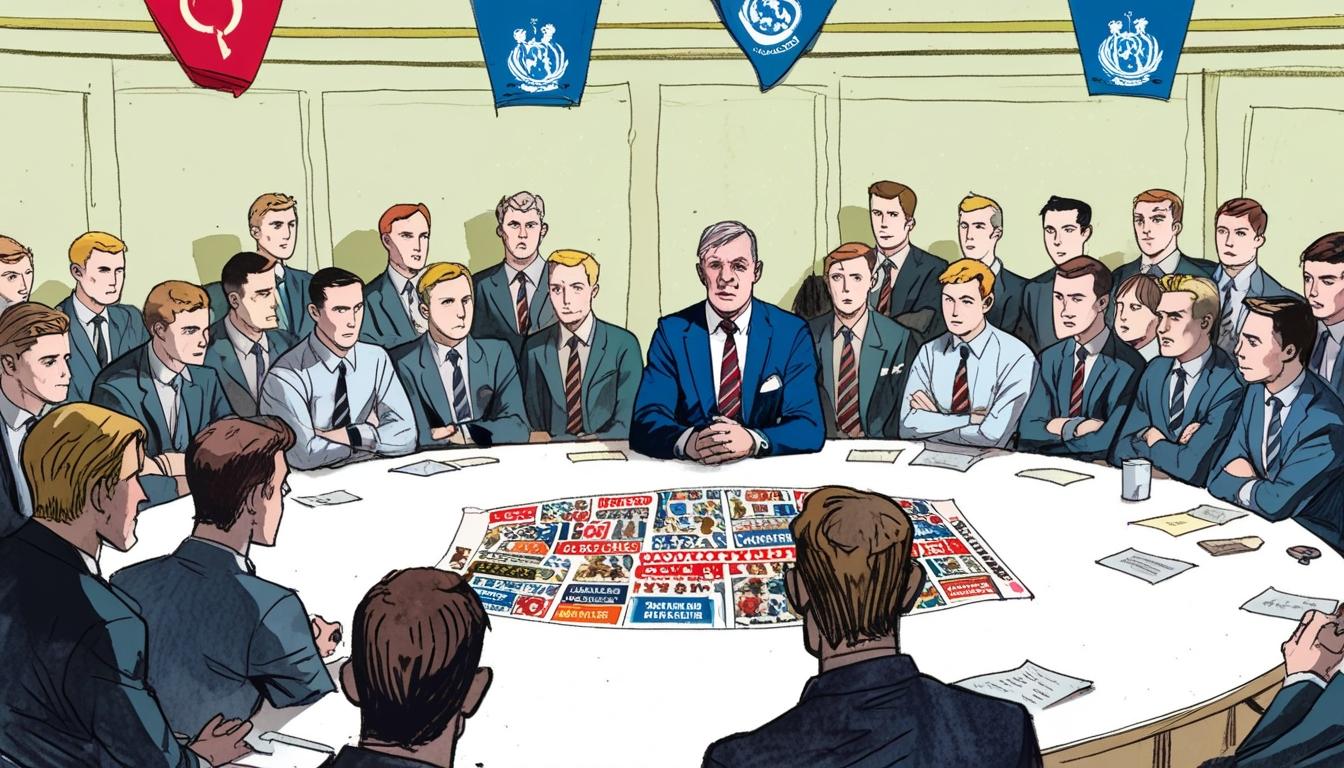SPFL Chief Executive Neil Doncaster has sparked controversy among Scottish football supporters and clubs due to management issues, handling of sponsorship deals, and his controversial views on league restructuring and fixture congestion, raising ongoing debate about the future of the Scottish Premiership.
Neil Doncaster, Chief Executive of the Scottish Professional Football League (SPFL), recently attracted significant attention and criticism over his handling of league issues and comments on league reconstruction, sparking debate among Scottish football supporters and stakeholders.
Doncaster has been at the helm of Scottish football’s top league since 2009, initially serving as chief executive of the former Scottish Premier League before overseeing the merger that formed the SPFL. His tenure has seen several controversies, notably around sponsorship deals and governance decisions.
One of the most prominent controversies involved the SPFL’s repeated failure to secure a title sponsor. Between 2020 and 2021, the league went without a sponsor for the second time under Doncaster’s leadership. When a deal was eventually struck in 2021 with the used car company cinch, the partnership quickly unraveled following a legal dispute initiated by Rangers Football Club. The club challenged the SPFL over its obligation to display cinch branding, citing an existing agreement with the car company linked to then-Rangers chairman Douglas Park. Rangers won the case, resulting in the SPFL apologising and paying a substantial settlement. Subsequently, cinch terminated their sponsorship after just three years of a planned five-year contract. This episode raised questions over Doncaster’s competence in managing commercial partnerships.
Further criticism arose from Doncaster’s recent statements about league reconstruction, made during an interview with Nutmeg Magazine. He asserted that while fans might express a desire for a larger top-flight league, their willingness to pay to attend matches supports the idea of maintaining a smaller league to sustain interest and revenue. He said, “One of the problems we have in this debate is that what fans say they want is not the same as what fans will pay for a ticket to go to.” This stance has been perceived by many supporters as patronising, particularly given the history of dissatisfaction with his leadership. The ongoing debate over league size features competing proposals, yet agreement among member clubs remains elusive, partly due to the SPFL’s voting system requiring an 11-1 majority for change.
The issue of fixture congestion was another topic on which Doncaster and SPFL Chief Operating Officer Calum Beattie commented. Doncaster suggested that expanded UEFA competitions have made the Scottish football calendar “unmanageable,” a point contested by observers noting that Scottish teams play the same number of league matches as their English counterparts but without the same additional European fixtures. Beattie linked fixture congestion to a postponed Dundee versus Rangers match last season, but the postponements were largely attributed to Dundee’s pitch issues rather than fixture scheduling.
The SPFL’s failure to implement proposed league restructuring plans has frustrated many supporters. In 2020, a survey by the Scottish Football Supporters’ Association involving over 3,200 members found 84% supported changing the format in which Premiership teams play each other four times annually, favouring an expanded league and fewer Old Firm matches. However, Doncaster remains a strong advocate for the current structure, which includes four Edinburgh Old Firm matches a season, a format pivotal to ongoing Sky TV broadcast arrangements.
Despite calls for Doncaster’s resignation or removal over his governance record, including from clubs such as Rangers, Aberdeen, Livingston, Motherwell, St Johnstone, and St Mirren, he continues to hold the chief executive position. A governance review last year concluded with Doncaster remaining in post.
Barry Hearn, a well-known sports promoter, criticised Doncaster’s leadership as far back as 2014, calling him an “empty jersey” who brought no real value or leadership. That criticism appears to echo the frustrations expressed by many in Scottish football today. While Doncaster maintains his role as the SPFL’s chief executive with responsibilities to govern and facilitate debate among clubs, some argue his active interventions in league restructuring discussions cross into advocacy, which they view as inappropriate.
The SPFL has confirmed that no changes will be made to the size or structure of the Scottish Premiership in the upcoming season, meaning clubs will maintain the current number of league fixtures.
This ongoing debate underscores complex issues facing Scottish football governance, commercial partnerships, and fan engagement, with questions about leadership effectiveness and league structure continuing to dominate discourse among clubs, officials, and supporters.
Source: Noah Wire Services
- https://www.heraldscotland.com/sport/football/23655951.rangers-win-spfl-apology-compensation-cinch-row-resolved/ – This article details the resolution of the dispute between the SPFL and Rangers over the cinch sponsorship, including the SPFL issuing an apology and agreeing to compensation.
- https://www.thenational.scot/sport/24299755.spfl-rule-change-rangers-cinch-fallout/ – This piece discusses potential rule changes in the SPFL following the fallout from the cinch sponsorship dispute with Rangers.
- https://www.rangersreview.co.uk/features/23615034.rangers-vs-spfl-cinch-dispute-detailed-timeline-explanation/ – This article provides a detailed timeline of the Rangers vs. SPFL cinch dispute, highlighting key events and resolutions.
- https://www.glasgowworld.com/sport/football/rangers-profit-spfl-cinch-deal-sponsorship-row-neil-doncaster-clubs-3733873 – This report covers the financial implications of the revised cinch sponsorship deal, including how Rangers benefit despite the sponsorship row.
- https://www.scotsman.com/sport/football/neil-doncaster-opens-up-on-rangers-cinch-dispute-new-spfl-title-sponsor-and-expanded-tv-deal-4616745 – This interview with Neil Doncaster discusses the resolution of the cinch dispute, the search for a new title sponsor, and plans for an expanded TV deal.
- https://www.inkl.com/news/rangers-excluded-from-new-spfl-cinch-deal-but-neil-doncaster-insists-clubs-won-t-lose-cash – This article reports on the exclusion of Rangers from the new cinch sponsorship deal and Neil Doncaster’s assurance that other clubs won’t lose revenue.
- https://www.dailymail.co.uk/sport/football/article-14661267/CALUM-CROWE-size-Scottish-Premiership-never-biggest-problem-man-charge-SPFL.html?ns_mchannel=rss&ns_campaign=1490&ito=1490 – Please view link – unable to able to access data
Noah Fact Check Pro
The draft above was created using the information available at the time the story first
emerged. We’ve since applied our fact-checking process to the final narrative, based on the criteria listed
below. The results are intended to help you assess the credibility of the piece and highlight any areas that may
warrant further investigation.
Freshness check
Score:
8
Notes:
The narrative discusses recent events and ongoing debates within Scottish football, indicating recent information. However, it also references past incidents, such as the sponsorship deal with cinch and Barry Hearn’s 2014 criticism.
Quotes check
Score:
6
Notes:
The narrative includes a direct quote from Neil Doncaster, but without a specified original source or date. While this could indicate a new quote, it lacks clear verification.
Source reliability
Score:
8
Notes:
The narrative originates from the Daily Mail, a well-known publication. However, the reliability can vary, and some information may lean towards sensationalism or opinion.
Plausability check
Score:
9
Notes:
The claims made align with ongoing debates and challenges in Scottish football, particularly around league structure and commercial partnerships. The governance issues and criticisms of Doncaster are plausible given historical context.
Overall assessment
Verdict (FAIL, OPEN, PASS): OPEN
Confidence (LOW, MEDIUM, HIGH): MEDIUM
Summary:
The narrative presents a blend of recent and historical information, which suggests a good level of freshness but requires caution due to potential biases in sourcing. The plausibility of the claims is high, but the absence of verified quotes and some reliance on recent events may affect the overall assessment. Therefore, while generally plausible, the narrative remains open to further investigation.













